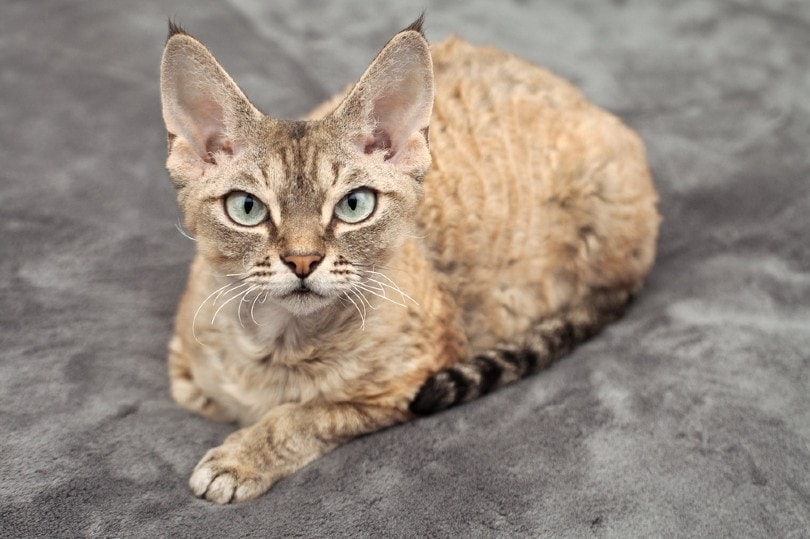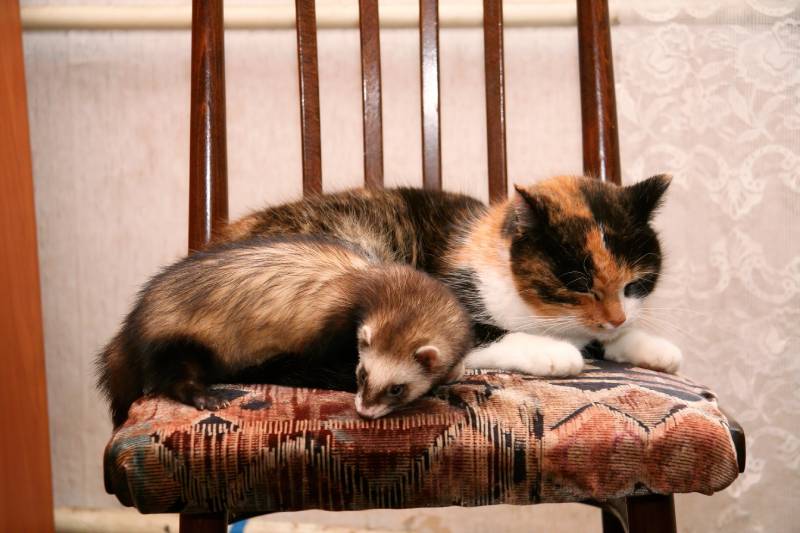Why Does Your Cat Grab Your Hand & Bite You? 8 Possible Reasons

Updated on
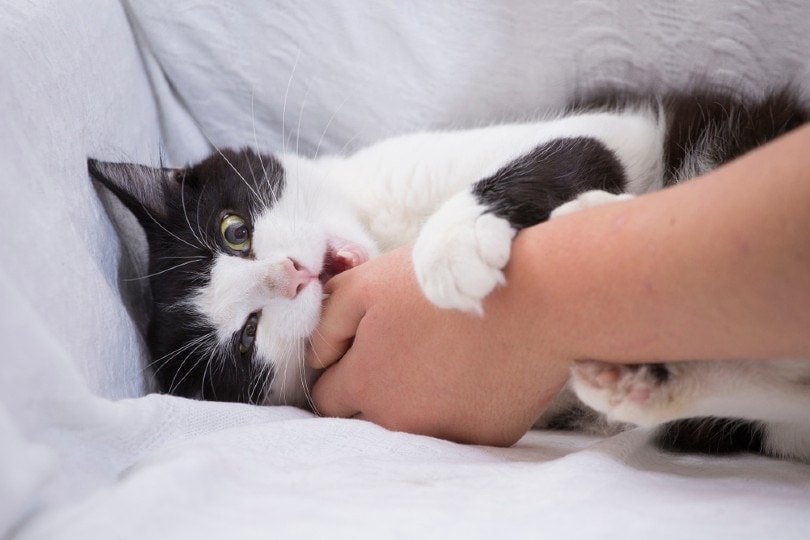
Cats have a reputation for being aloof and independent, but scratch the surface of their cool attitude and you’ll find an incredibly loving and affectionate pet. You do need to learn their love language. They’re not big on hugs and cuddles like dogs, and some of their behaviors are downright perplexing.
One of these is grabbing and biting your hand out of the blue. One minute, you’re petting them while they’re purring up a storm. The next thing you know, you’ve got those sharp teeth and claws sinking into your skin like a bear trap. What gives?
Here are 8 possible explanations for why cats love to bite you, plus some tips on how to prevent it from happening in the future.
The 8 Possible Reasons Why Your Cat Grabs Your Hand and Bites You
1. They’re Teething
Kittens start getting their teeth at around 3 to 4 weeks 1. While their teething phase is usually uneventful, their gums may feel sore and uncomfortable, much like it does with human babies.
Your kitten might be biting your soft and warm hand to help relieve the pain and pressure of their growing teeth.
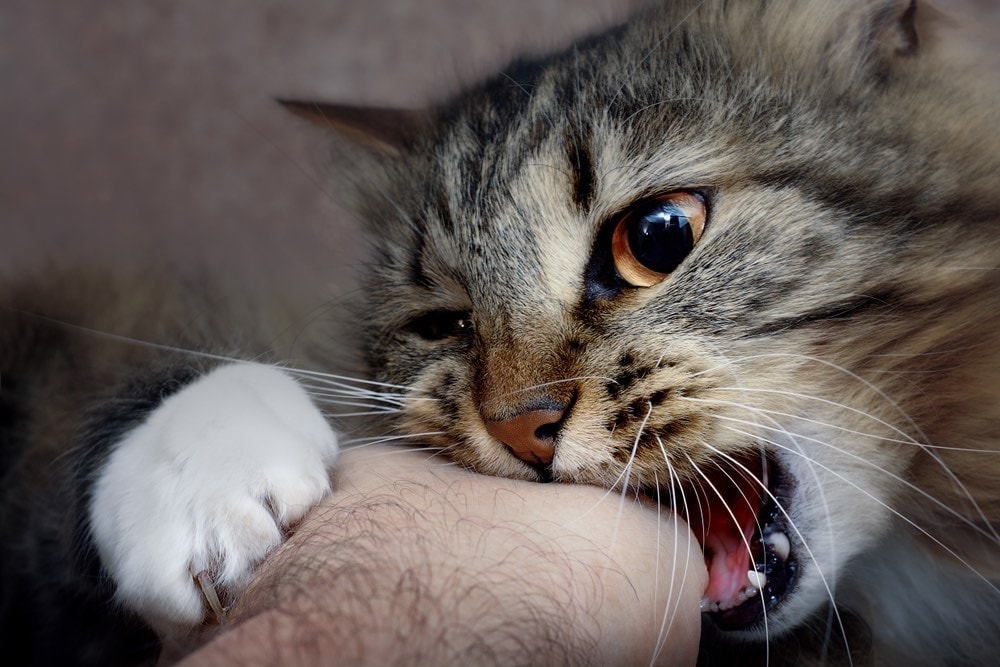
2. They’re Showing Petting-Induced Aggression
Petting-induced aggression in cats is also known as love bites, and that’s exactly what they are! Your kitty is biting you not to cause harm or out of anger, but because they’re enjoying the petting so much.
Love bites usually start as light nips, then progress into gentle bites with their paws locked onto your hand or harm. Sometimes, petting-induced aggression also involves bunny kicks or gentle scratches with their hind legs.
3. They’re Feeling Playful
If you’ve ever seen cats playing, you know it can get rough! Aside from being fun, feline playtime also allows cats to practice their hunting, stalking, and attacking skills. That’s why you’ll see a lot of jumping and pouncing in addition to biting.
When you’re petting your cat while they’re in the mood to play, they might instinctively bite and swat your hand as if it were their prey. It’s their way of saying, “Let’s play!”
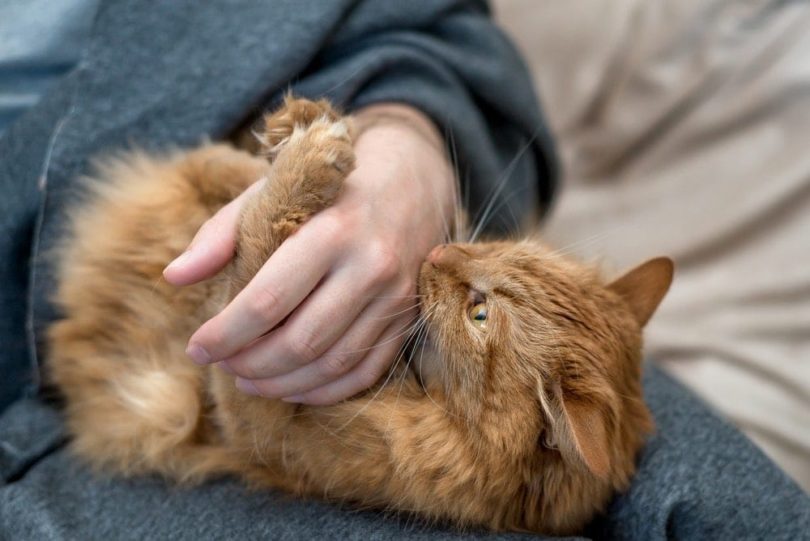
4. You’re Touching a No-Go Zone
Every cat has certain areas of their body that they don’t want to be touched. Depending on your kitty’s preferences, those areas could be their ears, tail, feet, or abdomen.
For most cats, though, their belly is the number one no-go zone. Their belly is a vulnerable part of their body and they may feel threatened when it’s touched. Once that happens, they may bite and grab your hand as a way to stop you from petting them.
Tip: Does your cat sometimes flip over and expose their belly to you (especially when they’re relaxed)? That’s not an invitation for petting. It’s just a sign of trust, so be respectful and leave them alone.
5. They’re Stressed Out
Cats can be incredibly sensitive and anxious creatures, which means they often need their own space. If your cat starts biting your hand when you’re petting them, it could be their way of telling you that they need a break from all the attention.
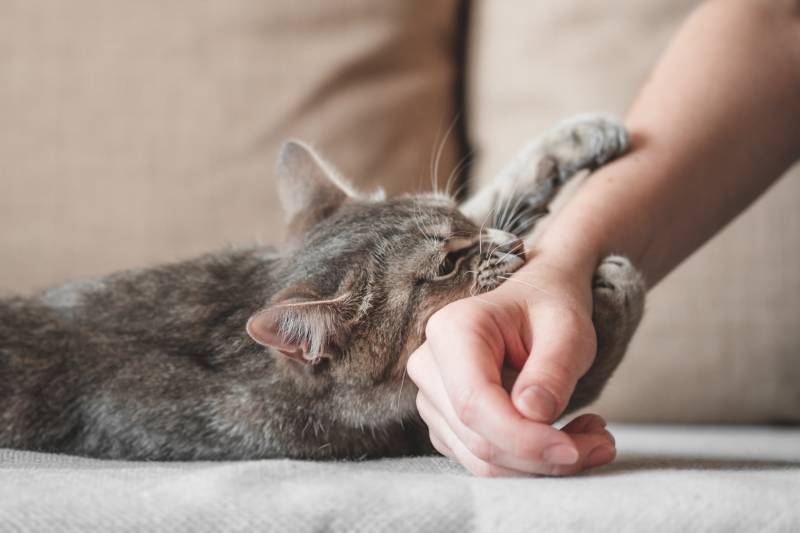
6. They’re In Pain
Biting and grabbing may be your cat’s way of telling you that something hurts. For instance, if you start petting behind their ears and they suddenly grab your hand, it could be a sign of an ear infection. Or, if they bite your hand when you touch their tail, it could be a sign of a flea infestation.
The same goes for any part of their body that you touch. So, if your cat bites you without warning, it’s a good idea to take them to the vet and have them checked out.
7. They’re Getting Overstimulated
Cats have heightened senses, and it doesn’t take much for them to feel overwhelmed. Being touched too much and for too long can cause sensory overload.
When your cat starts getting overstimulated, they may bite or grab your hand to warn you that they need a break.
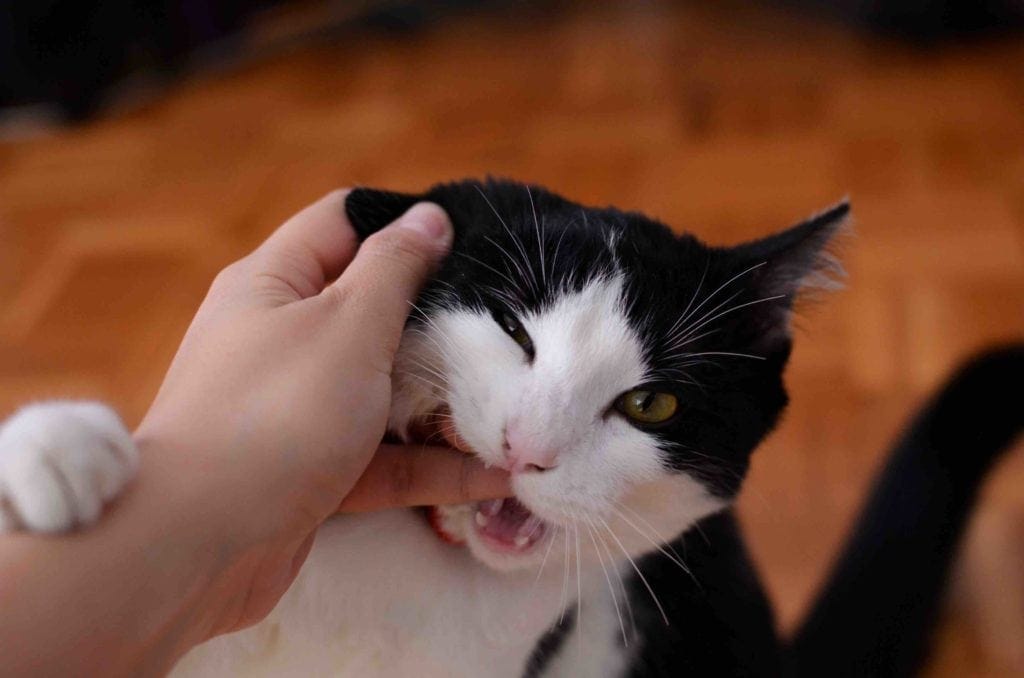
8. They’re Feeling Static Electricity
Some people also think that cats bite and grab hands because the stroking motions on their fur create static electricity. This could definitely be the case during times when you’re wearing wool clothes or sitting on synthetic fabrics.
Even the mildest static electricity can be uncomfortable for cats, so they might bite your hand as a reaction.
Is Your Cat Being Playful or Aggressive?
If your cat’s biting and grabbing behavior is due to fear, illness, or feeling threatened, it can quickly turn into a full-on attack. You need to identify the warning signs so you can de-escalate the situation and protect both of you from harm.
- Licking or nibbling on your hand instead of biting down
- Relaxed body language, such as a slightly open mouth and relaxed facial muscles
- Purring and meowing
- Tail curling
- Letting go immediately
- Claws are not fully extended, or are not extended at all
- Soft gaze and slow blinking
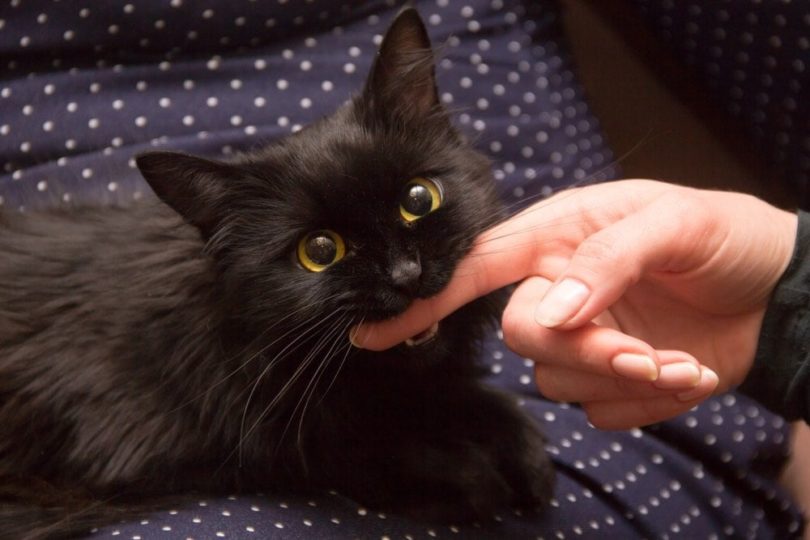
If, on the other hand, your cat is aggressive and feels threatened, their body language will be different.
- Growling and hissing
- Sharp focused gaze
- Stiff posture
- Ears pinned back against their head
- Fur bristling
- Tail swishing quickly
- Claws fully extended and biting down hard
If you notice any of these signs, it’s important to take a few steps back and give your cat some space. Don’t try to pet them again until they relax and show signs of trust.
How to Stop Cats from Biting & Grabbing Hands
Even the most playful bites form your cat can hurt you – human skin is way more delicate than their fur. So, it’s important to teach your cat that biting and grabbing is not acceptable behavior.
Here are some tips on how to stop cats from biting and grabbing hands:
Stop Playtime When They Grab and Bite
Continuing to move your hand while your cat is chomping down on it makes it more fun – their prey is making it more challenging! The moment they start the behavior, stop moving your hand and engaging. Eventually, they’ll learn that grabbing and biting equals game over.
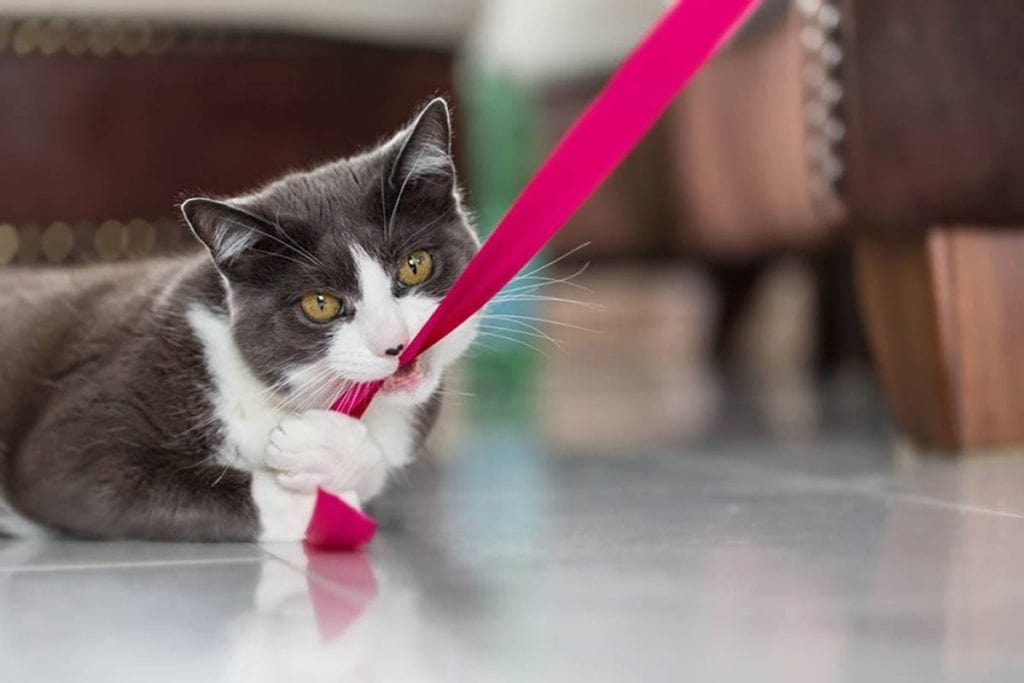
Redirect Their Attention
When your cat starts biting and grabbing your hands, distract them with a toy or give them something else to bite and grab. This is especially helpful if they’re doing it because they’re teething. They need something to bite, but it doesn’t have to be your hands.
Get Them Checked by Your Vet
Just to rule out any underlying medical issues, it’s best to take your cat for a check-up at the vet if you notice any sudden change in their behavior – including aggressive biting and grabbing.
Remember that cats are expert at hiding illness and pain. They have to be, because in the wild, showing that kind of vulnerability would make them easy prey.
Your vet can check if there’s any part of their body that hurts and provide proper treatment.
Final Thoughts
For the most part, your cat grabs and bites your hand because it’s part of their nature. It’s one of the many unique ways they express their affection, love, and playfulness.
If you don’t them to keep doing it, set some boundaries regarding the behavior. Finally, cats are complex creatures. Something as simple as grabbing and biting your hand may be a sign of something more serious, and a trip to the vet may be in order.
Featured Image Credit: Echeverri Urrea, Shutterstock




